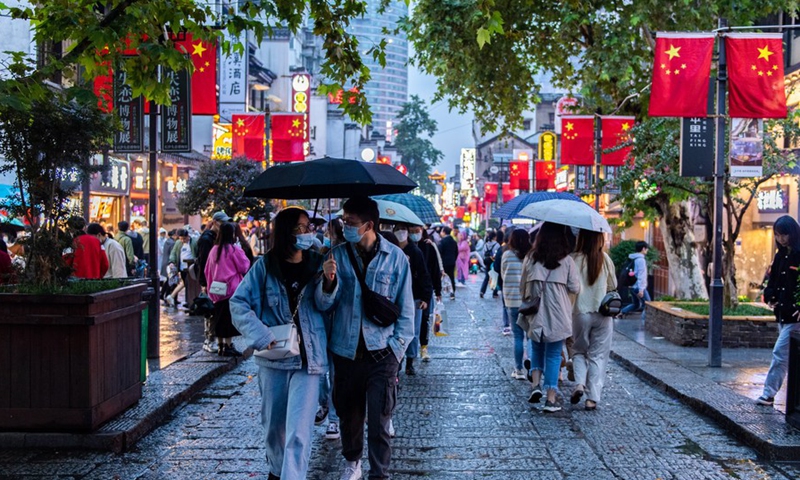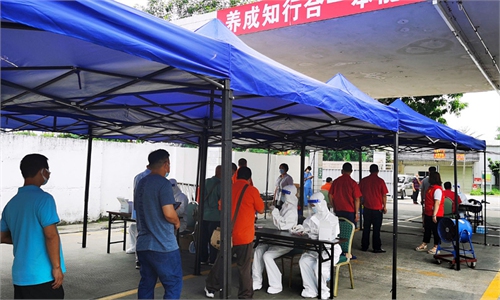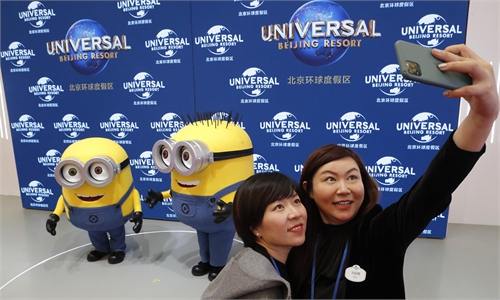Travelers may avoid outbound trips during upcoming holidays as concerns over virus linger

Tourists enjoy their time in Changsha, central China's Hunan Province, on Oct. 5, 2020, the fifth day of National Day and Mid-Autumn Festival holiday. Photo: Xinhua
As the Mid-Autumn Festival, first national holiday since the end of the latest COVID-19 flare-ups, approaches in two weeks, China's travel platforms saw lower enthusiasm from travelers than in previous years when train tickets went on sale on Sunday for the holiday, mainly due to concerns over any epidemic resurgence.
Tickets for trains on September 19, first day of the three-day Mid-Autumn Festival, became available on Sunday on 12306, China's national ticketing platform with a 15-day pre-sale period.
Multiple places in the nation, such as Central China's Henan and Hubei provinces, Southwest China's Sichuan Province and South China's Hainan Province, have resumed inter-provincial group tours and services for flights and hotel packages.
The cities that were previously hit by the recent COVID-19 surge, such as Nanjing, East China's Jiangsu Province, have also resumed train services after the outbreaks were brought under control.
Although travel limits have been largely lifted in the country as the outbreaks ebb, travelers are still being conservative about their plans. Many are likely to visit tourist attractions near home, insiders said.
A Beijing-based employee in the public relations department of China's travel platform Qunar.com told the Global Times on Sunday that so far, there's no "travel boom," which can usually be seen on the opening day of sales for national holidays, as users' enthusiasm is "basically low" in searching for travel destinations on the platform.
Concerns about new outbreaks are holding travelers back, she noted, adding that people would mainly choose nearby tourist attractions for travel during the Mid-Autumn Festival.
A hashtag that reminds travelers to purchase their tickets for the holidays became a hot topic on Chinese social platforms on Sunday. However, a survey that China News conducted showed that only 8.7 percent of nearly 4,000 respondents expressed a willingness to travel during the Mid-Autumn Festival holidays as of press time.
"I still feel it's not safe to travel during the holidays as the virus might rebound at any time, and I do not want to take the risk," said Zhu Zhu, a resident in Shenyang, Northeast China's Liaoning Province.
China's latest COVID-19 outbreaks that started in late July had been basically brought under control by the end of August. However, a positive case found in Guangzhou, South China's Guangdong Province, on Saturday once again raised the alarm about the country's epidemic prevention work.
China's tourism authorities told travel agencies to limit the number of travelers and carry out activities in different periods, batches and regions to avoid large gatherings of tourists.
The National Health Commission told all public transportation services, stores, malls and hotels to strengthen disinfection in key areas in a document issued on Wednesday.
Despite the tepid enthusiasm for holiday travel, some places were still singled out as potentially popular destinations for tourists during the three-day festival, including Beijing's Universal Studios Resort, the fifth Universal Studio in the world and the third in Asia, which is due to open for business on September 20.
According to Qunar.com, within half an hour after the resort announced its scheduled opening, searches for flights to Beijing were 11 times more than the same period the previous week, and bookings for nearby hotels became 10 times more popular.



